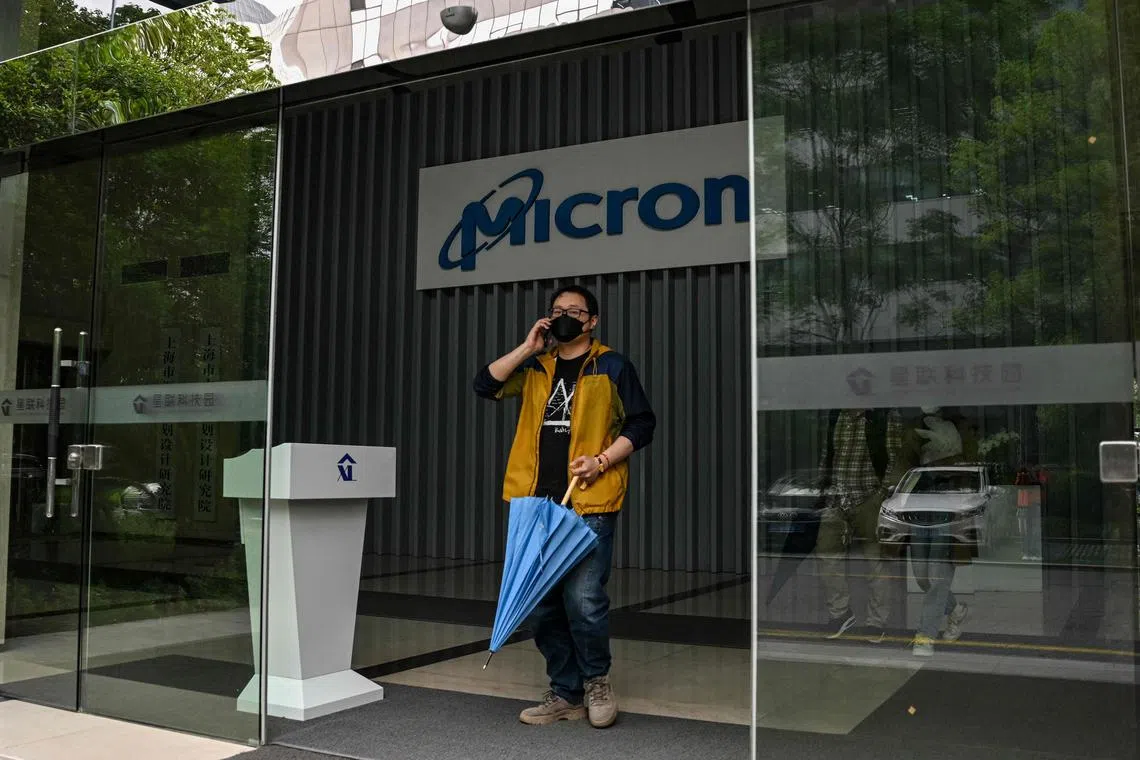South Korea to avoid cashing in on China’s US chipmaker ban
Sign up now: Get ST's newsletters delivered to your inbox

The decision by China to ban US chipmaker Micron has drawn South Korea into the US-China battle over tech access and national security.
PHOTO: AFP
WASHINGTON – South Korea will avoid capitalising on China’s ban on a US chipmaker
The South Korean government will not encourage its memory-chip companies to grab market share in China lost by Micron Technology, whose chips have been barred for use in critical industries by Beijing on national security grounds, said the source, who asked not to be identified as the topic is politically sensitive.
China is the biggest market for South Korean semiconductor companies Samsung Electronics and SK Hynix and home to some of their factories. Their continued operations in China are dependent on licences granted by Washington, giving the US some leverage over Seoul’s decisions on how it balances its economic engagement with both countries.
South Korea is also wary of taking advantage of the Micron situation as it sees the United States as a key long-term partner for its semiconductor industry and does not want to disrupt that relationship, said the source.
China’s Micron decision has drawn South Korea into the US-China battle over technology access and national security. While Washington is Seoul’s top security partner, China is South Korea’s biggest trade partner.
Export controls
The US – and its allies in Japan and the Netherlands has imposed a series of export controls on chipmaking equipment and know-how to China as the world’s top two economic powers increasingly square off in trade and technology.
“A broader ban of Micron semiconductors puts South Korea in the worst of both worlds,” said Korea Economic Institute senior director Troy Stangarone. If South Korean companies do not help with filling the gap left by Micron, China may penalise them the way it did for Seoul’s previous decision to deploy on its soil a US anti-missile defence system known as Thaad, he said.
The Financial Times reported earlier in May that South Korea signalled it would allow its companies to fill the gap left by China’s Micron ban. The government in Seoul denied that, saying it had yet to announce any formal position.
It remains unclear whether China would expand its crackdown on US chipmakers or how the US will respond to Beijing’s ruling on Micron. The two sides have recently tried to lower tensions and restore high-level talks, including meetings last week between top commerce officials in Washington.
Micron gets about 11 per cent of its revenue from companies based in mainland China. The company estimates total sales to China – combining direct sales plus indirect through distributors – comes to 25 per cent of revenue. It said last Monday that it was still evaluating the impact of the critical information infrastructure ban.
In a briefing on Saturday, US Commerce Secretary Gina Raimondo said Washington was speaking to allies about Beijing’s action on Micron. “We see it as plain and simple economic coercion,” she said. “And we won’t tolerate it, nor do we think it will be successful.”
The Chinese Commerce Ministry said in a statement after talks with South Korea amid the Asia-Pacific Economic Cooperation forum in Detroit last week that the two sides had agreed to strengthen cooperation on semiconductor supply chains.
A separate statement from the South Korean Trade Ministry made no reference to chips and instead said they discussed cooperation on stabilising critical commodities and components.
BLOOMBERG


